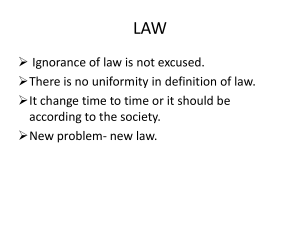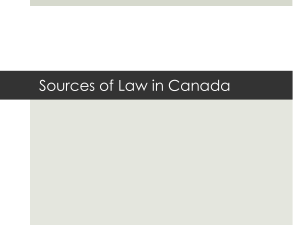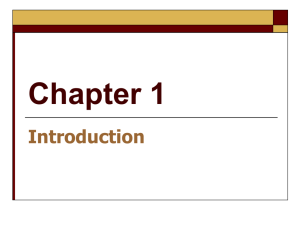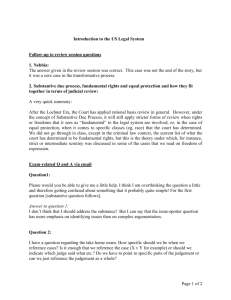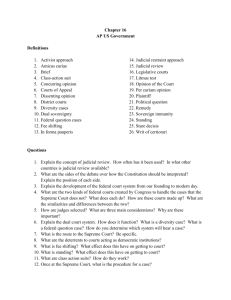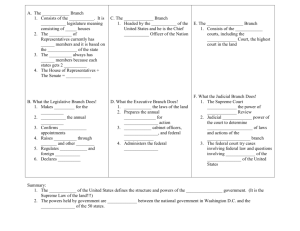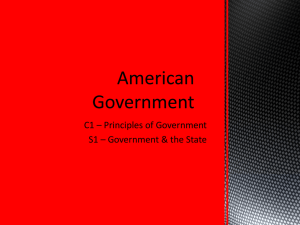Law : Concept and Sources
advertisement
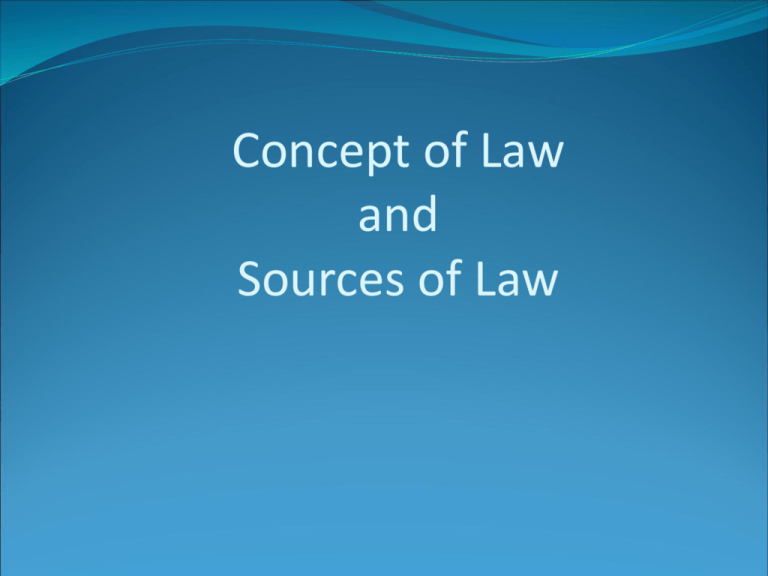
Concept of Law and Sources of Law Law is a Social Science Grows and develops with the growth and development of society New developments in society create new problems and law is required to deal with those problems Definitions of Law Austin Law is the command of the Sovereign. It is enforceable by a sanction Roscoe Pound Law is a social institution to satisfy social wants Salmond Law is a body of principles recognized and applied by the State in the administration of justice Moulton Law is the crystallized common sense of the community Purpose of Law Maintenance of law and order Enables individuals to have the maximum freedom to assert themselves Maximum satisfaction of the needs of the people Object of law Object of law is justice Justice operates at two different levels Distributive justice serves to secure balance among the members of a community Corrective justice serves to correct the dis-equilibrium created by a wrongful act Kinds of Law International law – Law of Nations Public International Law – Body of rules governing the conduct and relations of States with each other Private International Law – Rules and principles governing cases having foreign element. Applies to individuals and not to States Municipal Law – Law of the land Public Law – determines and regulates the organisation and functioning of the State and determines the relation of the State with its subjects Private Law – regulates and governs the relation of citizens with one another Public Law Constitutional Law – includes all rules which directly or indirectly affect the distribution or exercise of Sovereign power of the State Administrative Law – determines the organisation, powers and duties of administrative authorities Criminal Law – defines offences and prescribes punishments for them Private Law Personal Laws Law of Property Law of obligation General Law – Ordinary law of the land Special Law – Legal rules which are special and exceptional in their nature Kinds of Special Law Local Law – Law of a particular locality Foreign Law – Law of a foreign country Martial Law – Law applicable to soldiers as well as civilians in times of war or tumult Military Law – applicable to soldiers alone Elements of State State is a people organised for law within a definite territory Population – No State without people Territory – People settling down on some definite territory constitute a State Government – It is the machinery through which the administration of a country is carried on. It is outward manifestation of the State Sovereignty – It is that which is absolute and uncontrolled within its own sphere Functions of the State Primary War and administration of justice (Defence against external enemy and maintenance of law and order within the country) Secondary Legislation and Taxation (necessary for the welfare of the citizens) The relation between State and Law is very close and intimate The State manifests itself through law and law has its importance because it has the sanction of the State Sources of Law Legislation – Making of law by the formal and express declaration of new rules by some authority in the body politic which is recognised as adequate for that purpose Precedent - Making of law by the recognition and application of new rules by courts themselves in the administration of justice Customary Law – Constituted by customs which fulfil the requirements laid down by law as the condition for their recognition as obligatory rules of conduct Conventional Law - It is that which is constituted by agreement having the force of special law inter partes Legislation Means the making of the Law or declaration of legal rules by competent authority Supreme legislation proceeds from the Sovereign power in the State Subordinate legislation proceeds from any authority other than the Sovereign power Control over delegated legislation Parliamentary control Judicial control Public opinion Custom Uniformity of conduct of all persons under like circumstances It is observed course of conduct It is a rule which has existed from time immemorial and obtained the force of law in a particular locality When same thing is done again and again in a particular way, it assumes the form of custom Precedent Judicial decision to which authority has been attached The reason why a precedent is recognised is that a judicial decision is presumed to be correct Under this rule, a principle of law which has become settled by a series of decisions is generally binding on courts and should be followed in similar cases The doctrine has been recognised by the Constitution of India Article 141 provides that the law declared by the Supreme Court shall be binding on all courts in India The Supreme Court is free to depart from its previous decisions if valid reasons exist for doing so Substantive and Procedural Laws Substantive Laws – those which define rights, duties and liabilities Substantive Criminal Law is contained in the Indian Penal Code and various Special and Local laws Substantive Civil Law is contained in Acts like Indian Contract Act, Hindu Marriage Act, Transfer of Property Act etc. Procedural Laws or Adjective Laws – those which define the pleading and procedure by which substantive laws are applied in practice. Criminal Procedure Code Civil Procedure Code and Indian Evidence Act are the examples of Procedural Law
